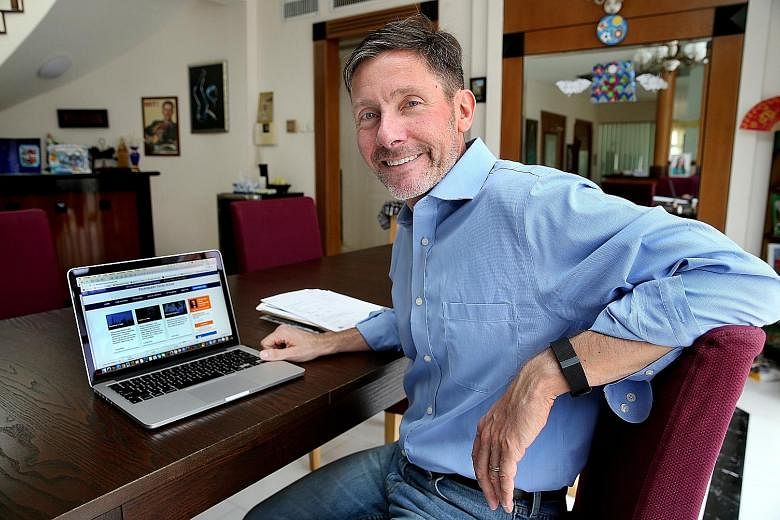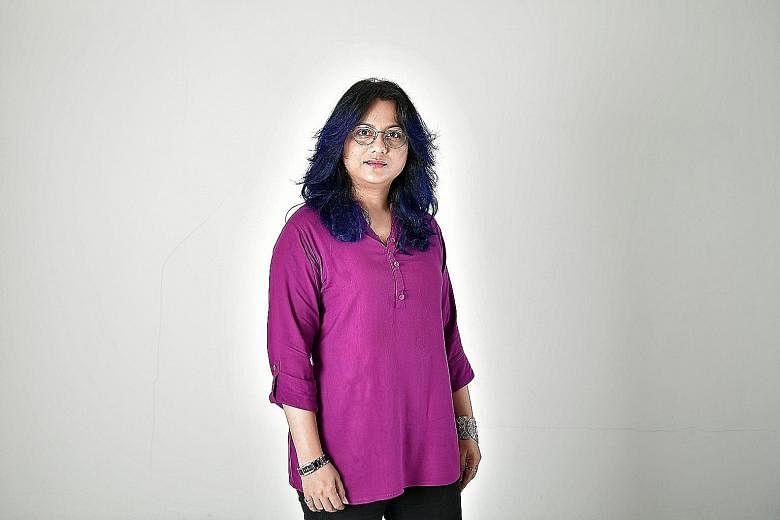Two things came in handy when Mr Kim Iskyan started working on the trading floor of an investment bank focused on Latin American markets: his fluency in Spanish and his bumpy knowledge of finance.
It was the early 1990s, and investors were warming up to the huge possibilities of bull markets in South America - but the trading desk of the bank had no Spanish speakers.
For Mr Iskyan, who spent most of his growing-up years in Spain and is fluent in the language, that was an opportunity - except that his degree was in history.
However, he made the best use of this unlikely combination of skills, placing himself right in the centre of the action on the trading floor - by answering phones, sending faxes, reading relevant literature and so on.
Sparse knowledge of finance, on the other hand, allowed him to start from scratch, as he took baby steps in the field of financial investment.
The exposure allowed him a close-up view of the inner workings of the market and polished his knowledge until, years later, it shone as expertise.
Mr Iskyan, now 46, spent the following 23 years in various roles - from security analyst to hedge fund chief - at different financial institutions in a number of countries, including the United States, Russia, Armenia, Sri Lanka, Kyrgyzstan, Ireland, Mexico and the Netherlands.
Mr Iskyan, who holds dual Dutch-American nationality, has been living in Singapore for the last 18 months with his American wife Tracy, an international developmental consultant, and their two children.
Here, he runs his own financial publishing firm Stansberry Churchouse Research. Previously called Truewealth Publishing, it recently partnered with US-based financial publishing giant Stansberry Research and Hong Kong-based Churchouse Publishing.
The firm specialises in bringing independent investment insight about Asia and the world to readers who are not financial professionals but who are looking for objective, understandable insights on markets and how they work.
-
Worst and best bets
-
Q What has been your biggest investing mistake?
A In early 2008, I started managing a US$120 million hedge fund in Moscow. Of course, that was months before the global economic crisis, and, as it happened, Russia's markets and economy were among the hardest hit.
I made the mistake of putting too much of my own money into the fund. I wanted to be able to say that I was eating my own cooking and, of course, I believed very strongly in the concept and in my own abilities, but I went a bit overboard.
I should have been more diversified, and not invested as much in my own fund. In the following months, the fund massively outperformed the relevant indexes, but was still down a lot. And my net worth took a bigger hit than I had ever anticipated.
Fortunately, I lost the battle but won the war. I was able to position my portfolio for the recovery, and my personal portfolio was made whole again before too many years passed.
But it was a big lesson for me, in macro-versification, and in getting in too deep on an idea.
Q What is your best investment decision?
A It was in 2004, when we moved to Ireland for work. My wife and I had just had our first child and were looking for a place to live, and we decided to buy a property.
It was boom time for Ireland, and property was expensive. But since we liked a place we saw, we decided to go for it.
When we reached the lawyers' office to sign the papers, we realised that they had got our names wrong, our property wrong, and the specifications of the house wrong (It was probably because it was a busy time for them as well).
They wanted us to sign on the papers despite the mistakes, which they said they would fix later. But we decided against it.
That was the best decision we made. Within a few years, Ireland went bust, and today, that house is probably worth half of the steep price we would have paid.
"Since I learnt from scratch, I have a very real understanding of what it's like to not understand anything about investing," he said. "So one of my main objectives at my business is to make investing accessible to normal people".
Q Moneywise how were your growing up years?
A I was born in the US to parents who were focused on their children, but were not suffocating. We moved often due to my father's job, which meant I spent my childhood in five to six different states in the US. By the time we moved to Spain when I was seven, I had studied in six different schools, made friends from all over and had great experiences to share.
The frequent travels expanded my horizons, and I knew that, as an adult, I would never be happy in one place for long. My parents were focused on value, and on not spending more than necessary. I also came to understand that money was a tool to a good life, not the objective of life.
Q How did you get interested in investing?
A My father was an armchair investor, a long time before investment became a thing for every Tom, Dick and Harry to try their hands at. When I was in university, my father gave me US$5,000 that he had invested on my behalf, and told me that it was mine to use in whichever way pleased me.
I started investing, and made some money in the market. But the early trial and error made me realise that I needed to learn a lot more about markets and I started to understand the value of real research and insight.
The best way to learn something is by doing, and that's how I learnt finance and investing.
Q Describe your investing strategy.
A I combine value and contrarian; and I think that at least looking at technical indicators is worth the time before buying a traded security.
The popular vision of diversification - of buying some stocks, some bonds, some real estate, maybe in a few different sectors - is wrong.
You want your portfolio to be balanced, so that assets whose prices fall are balanced by ones whose prices don't. But market history shows that during a crisis, everything, whether it's stocks or bonds or real estate, tends to fall at the same time.
Let's say you hold shares and real estate in Singapore, and hold only the Singapore dollar, and everything is in banks in Singapore, and your job is in Singapore, and your professional network is in Singapore. What happens if, God forbid, this country faces a financial crisis?
As such, I strongly believe in macro-versification - macro-diversifying by investing across countries, currencies and asset classes.
I'm an ecumenical investor, and borders don't mean much to me. I believe in going where the opportunity lies.
More than that, I think investors need to take a much more holistic view of their assets, their skill set, the languages they speak and the talents they have that can be applied to generate an income.
A lot of investors feel like they have to use their cash, and they're compelled to "buy buy buy" or "sell sell sell". But cash is the best hedge there is: It's cheap and it's liquid and, while it doesn't earn much of anything these days, it doesn't cost much, either.
Q What does money mean to you?
A Money means options. If you have money, the range of options expands dramatically. Without money, or with little money, that menu shrinks substantially. And as I said before, to me, money is a tool, it's a way to create options.
Q What are your immediate investment plans?
A I co-own and run Stansberry Churchouse, an independent investment publishing business. As part of my research, I scour the investment universe for safe and exciting investment opportunities. I'm always on the lookout for assets that are out of favour and which have the potential to post strong returns.
Q What's in your portfolio?
A My portfolio is over US$1 million.
I own investments in a mix of traded securities, private investments and real estate.
The traded securities are mostly US-listed, but have operations all over the world... from an Argentine oil company to Mongolian mining and natural gas in the US. For most investors, I think it makes sense to invest in exchange-traded funds that give broad exposure to markets. I do some of that.
Outside of public equities, I own a 49 per cent stake in a Sri Lankan company which owns real estate; in a Ukraine fund that deals with renovation and resale of real estate; less than 1 per cent stake in a private diamond mine in Australia; shares in a wind farm in Scotland; and a few houses in suburban Washington. But my biggest investment right now is my business.
Q How are you planning for retirement?
A I never think about retirement. Right now, I do what I love and I love what I do, and I look forward to continuing that kind of lifestyle for, well, a long time.
Q Home is now...
A Home is where my family is, which now is a rented property close to Simei. I like homes with a yard to be able to kick a ball around with my son and where my kids can have a trampoline in the garden. It is difficult here, but our landed rental property in Simei suits our needs. We've been in Singapore for a year and a half, and this is home.
Q I drive...
A I am not big on driving, so I leave that to my wife. We have a silver grey Honda CRV. We love it because its reliable, predictable, safe and steady.



